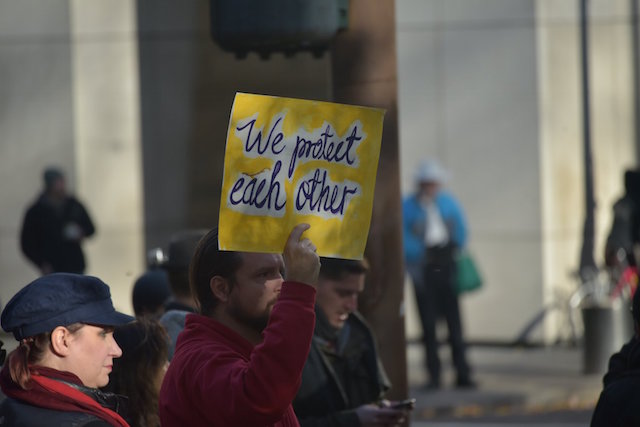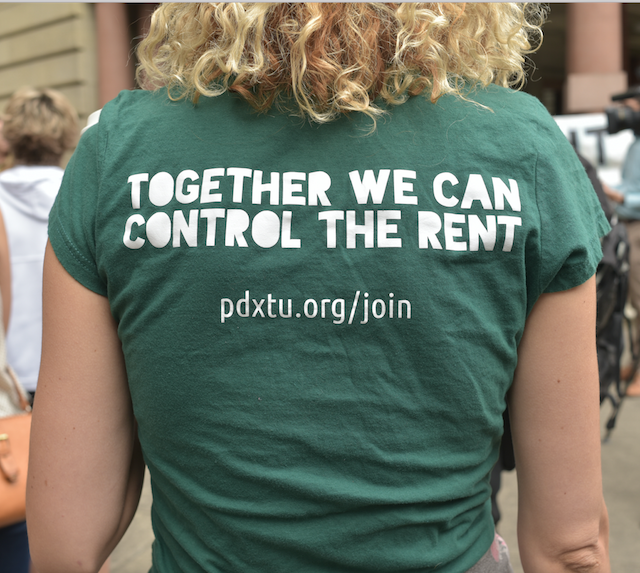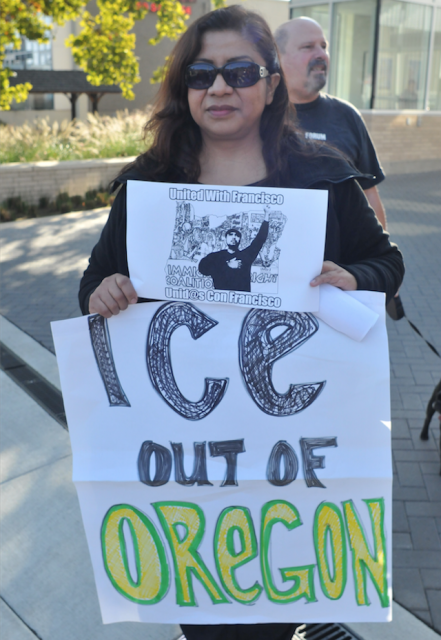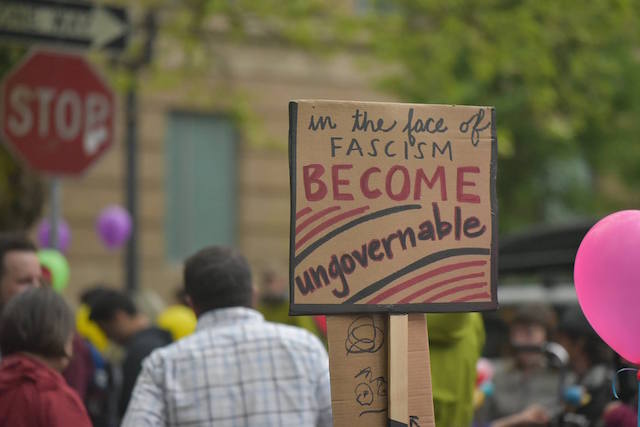
Story and photos by R.G. Manuel
Decrying the limitations of Sanctuary City status, the Portland City Council today declared Portland a “Stability City.” As a result, Portland will immediately move forward with plans making all its citizens have access to not just the bare necessities of survival, but also a standard of life and living that reflects the dignity that, in the words of Mayor Ted Wheeler, “should be the birthright of all humans.”
From the steps of City Hall, Wheeler announced, “I stand here before you on the land that held the traditional village sites of the Multnomah, Kathlamet, Clackamas, bands of the Chinook, Tualatin Kalapuya, Molalla and many other Tribes who made their homes along the Columbia River. Portland has long described itself as The City That Works, but for too long we have avoided asking for whom it works. Today we answer that question by saying Portland works for all Portlanders.”
The surprising decision came as it became obvious that despite possessing a supermajority in the Oregon legislature, as well has holding the governorship of Oregon, the Democratic Party was not willing to use its power to stand in the way of what are apparently the party’s paymasters: the various powerful interests standing in the way of desperately needed reforms, such as meaningful rent control, including lifting the preemption that forbids municipalities from enacting their own forms of it.
Commissioner Amanda Fritz stated, “The Democrats in this state, and frankly, in this country, are more useless than tits on a bull. Look at the nonsense that was supposedly a living wage. Living wage? On a good day–say, one in which you work 18 hours at three jobs–it might be a survival wage. You know, eat one meal a day, sleep on a mattress in the corner of a room you and five other people split the rent for. They really put the ‘rat’ in Democrat. Thank the Christ part of this stability plan will raise the minimum wage to $23 per hour and peg future increases to inflation.”
“What will this mean for businesses that are used to paying the current minimum wage,” asked a member of the Portland business community.
“It will mean,” said Fritz, “that if your business model does not take into account paying people a real living wage, then you don’t belong in business. End of story.
Unlike the state’s tepid raise of the minimum wage and its minimalist reforms that will do little to handle the housing crisis, the City Council’s actions will make Portland a livable city for all its citizens. Perhaps the most important aspect of the City’s plans will be that those most affected by the issues the City is seeking to rectify will be the ones making the decisions regarding the implementation of those plans. For example, when Wheeler was asked how the City’s stability status would affect the housing crisis, he stated, “Don’t ask me, ask Lisa Fay. She will be our City’s housing commissioner.”

Fay, along with her partner Ibrahim Mubarak, has long been involved in organizing people without housing, and the two of them, as Wheeler noted, likely possess more knowledge of how to deal with housing issues than any City Commissioner. “It should be obvious that they, as well as people without housing, are the ones we should be listening to on this issue,” said the mayor. “In fact, as usual, Lisa and Ibrahim are talking with people at Right 2 Survive and Right 2 Dream Too about their goals and needs.
Trillium Shannon, a former board member of Right 2 Dream Too, felt the change–particularly that the City was looking to people without housing for solutions to the housing crisis–was a long time coming. “We’ve seen a real turn around,” she said. “The city finally gave Right 2 Dream Too the $850,000 that was supposed to support finding a permanent home for our self managed rest area. We’ve waited years! And now this, opening up vacant houses and land. With access to land and buildings, we can use that money to set up hundreds of self managed communities. With the true experts in leadership positions and with access to resources, no one will be without a safe place to sleep. We’ve always had the solutions, but suddenly instead of being blocked at every turn, the houseless community is in charge of creative solutions. The city isn’t even trying to pretend the ideas came from them this time!”
Numerous studies have shown, unsurprisingly, that when people have stable living conditions, they are far more likely to find stability in other areas of their lives as well. The City Council has given Fay and Mubarak a healthy head start, declaring that as of today all vacant properties–houses, apartments, condominiums, buildings, office spaces, and any other unused spaces–will be used to house people without housing. “Last July,” said Wheeler, “Oregonbusiness.com published a study showing that Portland has about 16,000 to 17,000 vacant rental units. The people of Portland who do not have housing–Multnomah County believes there are about 4,200 people who spend their nights without housing–will be offered the opportunity to move into those dwellings. Lisa and Ibrahim, who know far more about issues of houselessness than I ever will, will work with people lacking housing to help them transition to housing.”
As to the remaining 12,000 vacancies, Wheeler said those units would be used by the City to help drive down rents. “If the state of Oregon will not allow us to have our own rent control, we will simply make our own rents from these properties that were otherwise effectively being used to drive up rents. When we start offering an apartment for a family of four at a rate that provides stability, making sure of basics such as three square meals a day, and other items that many of us take for granted–taking in a movie here and there, for example–you will see Portland truly become more livable. When that family of four only has to pay $200 for an apartment, not only will it–particularly the children–grow up with less stress and greater stability, but those 12,000 apartments at similarly supportive rates will drive down the rest of the rents in the City.”
A number of multi-unit landlords were on hand at the press conference, and one asked Wheeler if he thought it was fair that “those who played by the rules” would lose out, finding themselves the victims of instability.
“Your rules that you play by, frankly, are bullshit,” said Wheeler. “Your rules state that profit matters more than people. In other words, you would rather people die if it affects your profit. You would slit a person’s throat–or let them die in outside–for a buck. So I really don’t give a damn about your so-called struggles. I am more concerned with the struggles of the people who lack housing and those people who can barely make ends meet partially because of inflated rents because of your greed.”
In perhaps the most stunning move of this grand plan, Wheeler announced that he would be disbanding the Portland Police Bureau. It was several steps beyond the pugilistic attitude many Portlanders were hoping he would take toward upcoming contract negotiations with the police union.

“First of all, we should all know by now that all policing in this country comes out of the slave patrols of the antebellum South,” said Wheeler. “Their purpose has largely been to control bodies of color, particularly Black bodies, to oppress and repress those people who might rise up and demand a society that treats them as fellow humans, not objects to be murdered when they make these demands. Every 28 hours a Black person is gunned down by police or quasi-police like security guards, and even when the evidence is clear that the police were out of line, they get off. When was the last time a Portland police officer was held accountable for murdering someone? 40 years ago? If that is not white supremacy at work, I don’t know what is. And I do know what it is because like all white people, I have benefited from it and practiced it. We all need to acknowledge that.”
Wheeler announced that until the contract expired, the police bureau would be managed by various groups who have long been working for police accountability and toward abolition of policing based on white supremacy. He then turned over leadership of the bureau to Commissioner JoAnn Hardesty and Dr. Rev. Leroy Haynes of the Albina Ministerial Alliance Coalition for Justice and Police Reform. Hardesty, who led the charge to nullify Portland’s cooperation with the FBI’s Joint Terrorism Task Force, like Haynes, has long fought for holding the Portland police accountable for its actions. Neither were available for comment as they were busy reaching out to community members, particularly those from communities of color, for input into what Portland’s new community policing would look like.
Wheeler then turned over the microphone to Adam Carpinelli, a community organizer for The Jericho Movement, Oregon Jericho, Right 2 Survive, the Social Justice Action Center, and the Northwest Alliance for Alternative Media and Education. “The use of the term ‘policing’ joined with community in itself is a misnomer. It should be understood as ‘community building’ and upliftment. Community building can be defined as having neighborhood networks of people who don’t travel around with weapons and badges and aims to build sustainable and supportive communities of people invested in protection, safety and security. This refers to the economic, aesthetic, cultural, and psychological building of trust, understanding and mutual aid such as direct services that include conflict resolution skills when problems arise. Most of the problems that cops can’t deal or help with are meeting basic human needs and things that people need help with on a daily level such as food scarcity, housing and protection from patriarchal, transphobic and white supremacist violence that targets youth, women and gender non-conforming persons. With the billions of dollars spent on our police, military, prison, and surveillance state the national, state and city budgets could focus on eradicating so-called ‘crime, with food, housing, and education–some of the most basic human needs required for a safe, secure, and educated society. We can begin by eradicating houselessness, poverty, unemployment, and white supremacy for starters.
Related to police, Wheeler also stated the Council had decided to ban the Immigration and Customs Enforcement Agency (ICE) from Portland. “That Sanctuary City stunt we pulled a couple of years ago was a nice, shiny object,” said Wheeler. “But it meant nothing. Christ, we were becoming more a sanctuary for ICE agents than pretty much anything else. They were snatching people out of courthouses, and tearing apart families and communities. I mean, seriously, look at what ICE is doing down at the Mexico-US border. ICE should be taken before International Criminal Court. But in Portland we are saying No more. ICE and its agents are no longer welcome in our city. They have 48 hours to clear out their offices. If they have problems with that, they can take it up with CAUSA, IMIrJ, VOZ, and the other various immigrant rights groups in our city who will be overseeing ICE’s removal.”
Marco Mejia of the Interfaith Movement for Immigrant Justice (IMIrJ) was pleased. “ICE is a rogue agency that has become totally inhumane and cruel, openly violating the human rights of migrants, documented or undocumented. They have engaged for many years now in a human hunt, mostly of kids, hard working parents, grandparents, and people with disabilities. ICE and Department of Homeland Security torment people who have already gone through tremendous traumas in their countries of origin, and we say the trauma must stop now.”

Portland’s immigrant community has been attacked often since the current spasm of anti-immigrant fervor which began in the early 2000s. “We have seen,” said Mejia, “ICE agents detaining parents taking their kids to school, immigrants going to work, doctor’s appointments, or waiting outside the courthouse. I welcome this ban of ICE in Portland, so our communities can have a better, safer and more just place to live. We all have the responsibility to oust ICE and all forms of persecution and hate.”
Asked how the City would enforce keeping ICE out of Portland, Wheeler replied, “After consulting with the good people at Immigrant Law Group, the Council has decided to erect a series of stocks in Chapman Square. Any ICE agent found in Portland will immediately be publicly shamed in the stocks. Further violations will be meted out at the bastinado by our new Administrator of Justice who goes only by the name ‘Moto.'”
Toward the end of the press conference, some of the crowd was getting testy. When asked how the City would pay for these plans, Wheeler stated Portland would raise taxes on the rich and on businesses. But more importantly, Wheeler said he was opening the door to other options, which, as was the common theme, would be gathered from the people who have shouldered the brunt of the business community’s avarice. He suggested the City would support the development of more worker run cooperatives, such as the Alberta Co-Op Grocery and People’s Food Co-Op. The worker run cooperative model, he said, could be applied to any business, and it too would provide greater stability for workers
Nick Neumann, a collective member at a worker run co-op, was pleased by Wheeler’s embrace of worker run cooperatives. “In worker run cooperative models, workers can make tough decisions democratically, and worker welfare is part of the bottom line. Wheeler told me a few days ago when he was shopping at the co-op where I work, he believes putting the means of production in the hands of the proletarian class will undoubtedly dismantle the heavy grasp of the bourgeoisie.
Other options floated by Wheeler included a Townsend Plan for Portland. The Townsend plan, crafted in the 1930s, provided the model for Social Security. It proposed that people over 60 who were retired be paid $200 a month that had to spent within 30 days. It was to be funded by a two percent sales tax.
“I see no reason why it should not work,” said Wheeler, while noting that the plan was a far more accurate rendering of supply side economics. “We are always told if you give the rich more money, they will create more jobs. It was nonsense with Reagan, and it remains a nonsense supported by the vast majority of both Democrats and Republicans. They don’t care about creating jobs. They care about getting more money and power. I say we see what happens when that money goes to people who actually need it. You know what will happen? They will spend it, maybe at the many worker owned co-ops that will soon be popping up. Take the taxes from that, and put some of it back into the plan, and use the rest to help prop up other programs.”
“And we are going to put a lot of people to work,” added Wheeler, “when we begin retrofitting Portland for solar, wind, and geothermal energy. The savings from those sources of energy will, among other things, provide funds for retrofitting buildings so they can better withstand earthquakes.”
One former reporter for the Portland Mercury, a traitorous sort if ever there was one, asked Wheeler if he was worried about how the business community would respond to this plan.
“Well first, Mr. Arnold,” Wheeler replied, “the Portland Business Alliance, the Portland Greedhead Alliance, or whatever it calls itself these days, can go fuck itself. You know what? If your business does not want to do business in our city anymore, go incorporate yourself across the river in Vancouver. Have fun hiring people like these goose-stepping Patriot Prayer fools. Maybe you can make Jeff Niiya your company’s headhunter and spokesperson.”
“Isn’t this plan anti-capitalist?” asked a lobbyist for the Oregon Rental Housing Association.
“Is it pro-capitalist to build a country of land stolen from the indigenous population, on the backs of enslaved Africans?” replied Wheeler. “The answer to that question, by the way, is yes.”

“Our plan,” continued Wheeler, “is pro-people. It’s about valuing all people more than obscene profits for the few. It says I care about my neighbors’ well-being more than I care about having three houses or four cars. Really, it says I am not a selfish prick who completely ignores the consequences my actions impose on others.”
“I like to think our plan expresses much of what Jesus said in the gospels. So, yes, I guess you could call it anti-capitalist. And I can’t wait until we enact a single payer insurance, universal access healthcare system that will drive those money changers out of the temple.”
As a reporter asked another question, Wheeler cut him off sharply with a chop of the hand. “Stop!” he said in raised voice. “Why are you asking me these questions? Talk to the people–no, wait: listen to the people–who for too long have had to suffer under the conditions created by an economic system designed to consolidate wealth and power in the hands of a few people at the expense of everyone else. That’s what I am doing, finally. And it is what you should be doing, too. Just listen to the people. They know more about these issues and what they need than you or I do. So listen to them.






